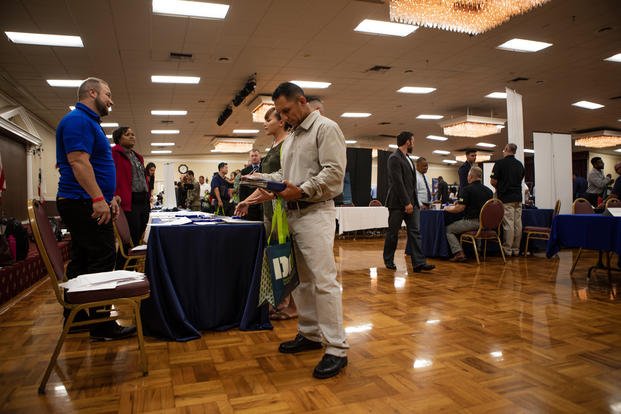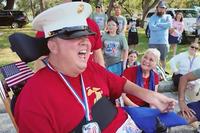Michael Hansen is a former Marine and combat veteran, and the national director of military affairs for Power Home Remodeling.
July 25 is National Hire a Veteran Day and, according to the U.S. Department of Labor, employers are doing just that, with the veteran unemployment rate at 3.2%, the lowest since 2001.
At face value, this is a great statistic. I want to see all my fellow service members thrive in what can be a difficult transition into civilian life. Landing a good job is a critical part of a successful transition because it instills in us the sense of mission and purpose that propelled us on a daily basis in the military.
But too often on the employer side, the impetus behind hiring veterans is about perception over purpose. From hiring quotas to public relations campaigns to corporate philanthropy, there are many reasons that employers pursue and hire veterans, but gaining our world-class leadership skills doesn't seem to rank high on their priorities.
We want you to hire us. But we don't want you to hire us for the wrong reasons.
Without good intentions and a strategy to make the best use of our skills, a surface strategy will inevitably yield low employee satisfaction, which contributes to low retention rates, given that 65% of veterans leave their first job within two years.
Veterans possess qualities highly prized by corporate recruiters -- such as grit, forced adaptability, perspective and leadership that can't be taught in a classroom or by reading the latest business leadership book. And our study abroad program? Let's just say it's more intense than a semester in Rome. Veterans are the best leaders our generation has to offer, and their untapped potential is available for the taking.
Yet, as veterans, we haven't always done the best job of telling that story, or realizing how valuable those qualities are in the civilian workforce. You'll hear this many times over if you ask veterans, but when we leave the military and part from our teams, we also part with our identities as individuals and leaders. It can feel like all the training, hardships, triumphs and successes we achieved together are trapped in a time capsule, relevant to a bygone time.
It can also be uncomfortable making the case that our leadership and skills are equal to, if not more valuable than, those of our civilian counterparts. After all, we learn the values of purpose over position, service over self, and team over everything, so braggadocious self promo isn't a look we feel comfortable with.
But it's been to our detriment. We don't get hounded by corporate recruiters like members of other elite leadership training clubs such as Harvard or Wharton. And we should. We have the training and skills to make a giant impact on the corporate bottom line.
This is what we proved at Power Home Remodeling, where I started as a sales associate, quickly climbing from entry level to generating over a million dollars in sales. When I realized that other veterans like myself were thriving and performing better than many of our civilian counterparts, a lightbulb went off. After taking a second look at our staff, I found higher sales numbers from veterans across the company, coupled with cleaner jobs and higher customer satisfaction scores. The data were clear, and it was happening organically, in plain sight.
I then imagined what could happen if we put some money and muscle into hiring more veterans backed by a solid strategy. I thought, if we scaled this thing and the numbers continued to prove the case, it could be a major success story for both the company and for the veterans who would eventually be hired. I pitched the idea, and our co-CEO was all in. He not only approved it, but backed our military hiring program with money and C-suite buy-in.
Today, the Power Veterans Initiative is built into the fabric of the organization. Since inception, we've boosted veteran and spousal employment from less than 2% of our employees to 8% today, and 13% of our new hires are veterans or military spouses. We built a veteran mentorship infrastructure across the country and secured $2 million in dedicated annual funding from our co-CEOs. Power has gone from a company with a blind spot to a national leader on behalf of veterans.
The part that is most rewarding to watch is that, unlike programs that get unwieldy with size, implementing a corporate veterans infrastructure actually thrives with scale. Our operations model requires significant teamwork, so we have the ability to cluster veterans together both laterally and vertically, the best and ideal way to maximize their potential. As soon as veterans are grouped together with a joint sense of mission and purpose, you literally get to see the switchboard light all the way up -- it's palpable and powerful.
As the layers of grit, forced adaptability, perspective and leadership grow exponentially, they produce a return on investment far greater than anticipated. The companywide veterans ecosystem becomes a form of corporate therapy that's beneficial for the bottom line and for the soul. Veterans regain an experience that is hardwired in them, and the company gains leaders capable of driving major revenue. It's worked for us, and I hope you figure out a way to make it work for you.
There are so many talented veterans out there, and I wish we could hire them all. But until we are scalable enough to do so, they are yours to compete for. My only ask is that you do it for reasons of purpose over perception. And when you do, provide them with an environment to thrive and be a part of your company's success story.
-- The opinions expressed in this op-ed are those of the author and do not necessarily reflect the views of Military.com. If you would like to submit your own commentary, please send your article to opinions@military.com for consideration.














